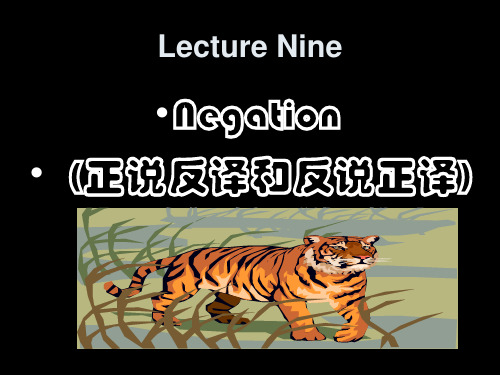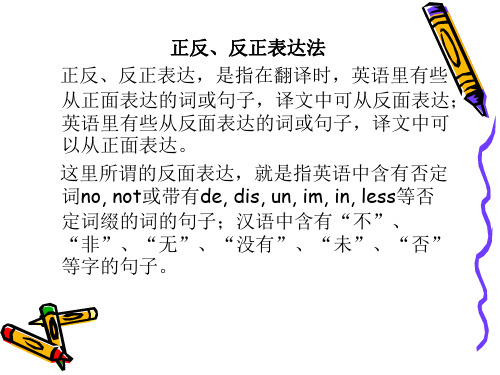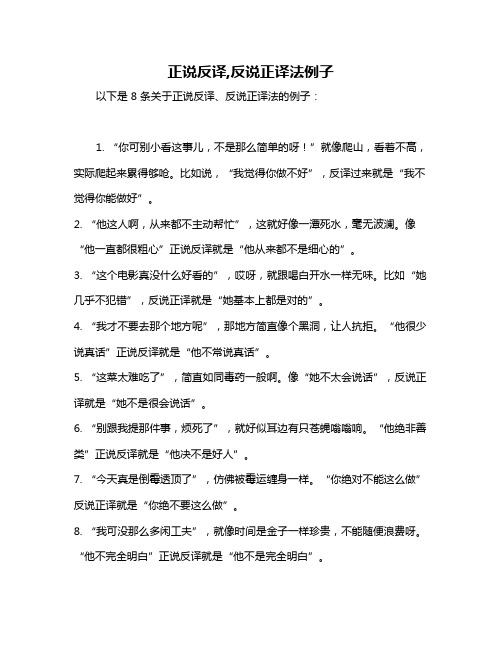笔译正反表达法翻译句子
笔译正反转换法

•英语中有很多词虽然是以肯定形式出现,但本身却含 有否定意义,如beyond, absent, stop, bad, avoid, except, doubt, resistant, refuse, few, little等等。这类词在翻译中 要译出它含有的否定意义。
Keep off the lawn! 请勿践踏草地!
I couldn’t agree more with you. 我完全同意你的看法。
He was the last man to say such things. 他绝不会说出这样的话。
• 今天讨论的主要指带有否定词的正反翻译。英 语中含有no,not,never,none,un-,-less, im-,in-,ir-等成分的词句,都被视为否定表达, 简称反说。相反,英语中不含这些成分的词句称
His speech leaves much to be desired. (phrase. )
他的讲话很不尽如人意。
The guerrillas would fight to death before they surrender. (conj. ) 游击队员们宁愿战死也决不投降。
The lecturer spoke above the heads of his audience. (prep. ) 讲演者讲得太深奥,听众听不懂。
The significance of these incidents wasn’t lost on us. 这件事引起了我们的重视。 Hitler’s undisguised effort to persecute the Jews met with world-wide condemnation.
英汉翻译(9)正反译法

• 6) Herb may be dying somewhere, calling out for his mum and dad, and only strangers round him. • 哈伯在某处正在死去,哭爹喊娘的,可身边没有 一个亲人。 • 7) All night long the beating and questioning goes on, the search goes on. • 整夜拷打不断,审讯不断,搜查不断。 • 8) I've read your articles, I expected to meet an older man. • 我拜度过您的大作,没想到您那么年轻。
• • • •
• • • • • • •
ห้องสมุดไป่ตู้
Affirmative-negative-transformation of propositions 1) Socialism is beyond doubt superior to capitalism. 社会主义制度无疑优于资本主义制度。 2) I'm very much surprised when the volunteers gave us cigarettes instead of killing us. 志愿者给我们烟抽而不杀我们时,我感到吃惊。 3) There is one great issue in the balance here today. 今天,这儿有一个悬而未决的大问题。 4) Under fifty people were there. 那儿不足50个人。 5) His answer is beside the mark. 他的回答文不对题。
• • • •
•
• • • •
第九节 正反、反正翻译法

(四)名词 1.It was said that someone had sown discord among them. 据说有人在他们中间挑拨离间。 2.Generally she accepted the family life in all its crowded inadequacy. 在通常情况下,她还是能忍受她那拥挤寒 碜的家庭生活的。 3.He took an instinctive dislike to the woman. 他本能地讨厌那女人。
正反、反正表示法
• (三)形容词 • We are watching the fluid situation with concern. • 我们关注着动荡不安的局势。 • Appearance is deceptive. • 外表是靠不住的。 • But I stood firm.(P191 line2) • 但是我丝毫没有退步。
正反、反正表示法
Байду номын сангаас
• • • •
(二)副词 We may safely say so. 我们这样说错不了。 They resumed(重新占用) their seats moodily (易生气地). • 他们又不愉快地坐了下来。 • We live meagerly(贫乏地), but as the same time, we blessed in many ways. • 我们生活并不富裕,但在很多方面我们又 是幸运的。
(六)名词
句子中含有否定语气的名词,可译为否定句。这类名词如: defiance (不顾,无视) denial (否认,否定) exclusion (排除) freedom (不,免除) lack (无,缺乏) failure (不成功,不足,不履行) refusal ( 不愿,不允许) loss (失去)
正反表达英语翻译

16、Those who fear the influence of television deliberately underplay its persuasive power, hoping that they might keep knowledge of its potential to effect social change from being widely disseminated. 那些害怕电视影响力的人故意贬低电视的说服 力,不希望电视影响社会的潜力得以广泛传播。
1、He was an indecisive sort of person and always capricious. 他这个人优柔寡断,而且总是反复无常。 2、Out of sight, out of mind. 眼不见,心不念。 3、My husband missed the last bus, so he had to go home on foot. 我丈夫没有赶上末班公共汽车,所以只好步 行回家。 4、In the high altitude snow and ice remain all year. 高海拔的地方,冰雪终年不化。
第七节正反译法

第七节:正反、反正表达法(Negation)1. Our PLA is worthy of being called a great army of the people.2. He tries his best to overcome the lack of technical data.3. The window refuses to open.4. Yesterday he failed to get to school on time.5. They excluded children (from) getting in.6. That building is in a state of neglect.7. He’s often absent-minded.8. Lei Feng’s noble deeds are above all praise.9. I, rather than you, should do the work.10. The truth is quite other than what you think11. Live up to the expectations of our own people and the people throughout the world.12. Slips are scarcely avoidable when you’re new to your work.13. There are two aspects to everything; to say there is only one is to be aware of one aspect and to be ignored of the other.14. In technology, I think first we have to follow others in most cases, and it is better for us to do so, since that is what we are lacking at present and know little about.15. The meeting were marked by such an absence of lively discussions that at times they were almost on the point of breaking up.16. The scientists made a solemn pledge at the conference, saying,“We’ll for ever live up to what our Party expects of us.”17 The County Party Committee there is ignorant of conditions at the lower levels.18 The fellow is far from being honest.19 The city and the areas around it are an ice-free port and a nuclear-weapon-free zone.20 He stood still, trying vainly (in vain) to answer the battery of questions the boss raised.21 The world today is far from peaceful.22 She refrained from laughing.23 She was refused admittance by them.24 The evidence is conclusive, excluding all possibilities of doubt25 Mr. White has refrained from making any official comment on the coup in that country.26 That served to strengthen instead of weaken our determination (or: That strengthened, rather than weakened, our determination.)27 But for the workers’ help, we should not have succeeded in this experiment.28 The first bombs missed the target.29 Such a chance was denied me30 This problem is beyond me.31 When Philip missed the last bus, he was at a loss to know what to do.32 He unfastened his shoelace.33 I rode around with him one day seeing how the ships unloaded.34 Many agreed that the Prime minister had in effect resigned dishonorably.35 He was an indecisive sort of person and always capricious.36 It was said that someone had sown discord among them.37 He manifested a strong dislike for his father’s business.38 Don’t lose time in posting this letter39 The significance of these incidents wasn’t lost on us.40 Such flights couldn’t long escape notice.。
正说反译,反说正译法例子

正说反译,反说正译法例子
以下是 8 条关于正说反译、反说正译法的例子:
1. “你可别小看这事儿,不是那么简单的呀!”就像爬山,看着不高,实际爬起来累得够呛。
比如说,“我觉得你做不好”,反译过来就是“我不觉得你能做好”。
2. “他这人啊,从来都不主动帮忙”,这就好像一潭死水,毫无波澜。
像“他一直都很粗心”正说反译就是“他从来都不是细心的”。
3. “这个电影真没什么好看的”,哎呀,就跟喝白开水一样无味。
比如“她几乎不犯错”,反说正译就是“她基本上都是对的”。
4. “我才不要去那个地方呢”,那地方简直像个黑洞,让人抗拒。
“他很少说真话”正说反译就是“他不常说真话”。
5. “这菜太难吃了”,简直如同毒药一般啊。
像“她不太会说话”,反说正译就是“她不是很会说话”。
6. “别跟我提那件事,烦死了”,就好似耳边有只苍蝇嗡嗡响。
“他绝非善类”正说反译就是“他决不是好人”。
7. “今天真是倒霉透顶了”,仿佛被霉运缠身一样。
“你绝对不能这么做”反说正译就是“你绝不要这么做”。
8. “我可没那么多闲工夫”,就像时间是金子一样珍贵,不能随便浪费呀。
“他不完全明白”正说反译就是“他不是完全明白”。
我觉得这种翻译方法很有趣,能让我们更灵活地理解和运用语言,有时候能更加准确地表达出我们的意思呢!。
句子的翻译-正反法

c. 形容词和形容词短语:few, little, free from, far from, safe from, short of等等
这次演出根本没有失败,而是十分成功。
The show was far from being a failure; it was a great success.
13
把马克思主义的普遍真理同我国的具体实 际结合起来,走自己的道路,建设有中国 特色的社会主义,这就是我们总结长期历
史经验得出的基本结论。
To integrate the universal truth of Marxism with the concrete realities of China, blaze a path of our own and build socialism with Chinese characteristics — —this is the basic conclusion we have reached in summing up the long historical experience.
句子的翻译-正反法
1
正反——反正翻译法
英语和汉语均有从正面或反面来表达一种 概念的现象。如果原文从反面表达直译出 来不合乎译语习惯,就可考虑从正面表达, 反之亦然。使用哪种方法,主要看译语表 达习惯及修辞效果而定。
2
正——反翻译法例句: Herb may be dying somewhere, calling out for his mum and
他显然有不同的想法。 He evidently thinks otherwise. 我根本不知道他会遇到什么麻烦。 I little knew what trouble he was going to
第九章正反反正翻译法解析

English-Chinese Written Translation. Copyright (C) 2006 by Wei Jianhua All Rights Reserved
(1)动词:
excuse 对不起 lack 不足/没有 overlook 没有注意 refuse 不答应 hate 不喜欢
English-Chinese Written Translation. Copyright (C) 2006 by Wei Jianhua All Rights Reserved
(5)名词
little没有多少 ignorance 无知 in doubt 拿不准 refusal 不答应 out of place 不恰当/不在适当位置 absence 不在 anything but 概不/决不
●通常正面反译的单词:
miss 未赶上/未击中 fail 不及格/没有成功 ignore 不顾/不理 neglect 不注意 exclude 不包括 refrain from 忍不住… wonder 不知道 fancy 想不到 lose 抓不住 / 听不见/ 看不见
例: 1、The first bombs missed the target. 第一批炸弹没有击中目标。
1.The failure was the making of him. 这次不成功是他成功的基础。 2. The operation only just succeeded and it was fortunate that we had provided additional forces.
这次战役好不容易才取得胜利,也多亏我们增加了兵力。
English-Chinese Written Translation. Copyright (C) 2006 by Wei Jianhua All Rights Reserved
- 1、下载文档前请自行甄别文档内容的完整性,平台不提供额外的编辑、内容补充、找答案等附加服务。
- 2、"仅部分预览"的文档,不可在线预览部分如存在完整性等问题,可反馈申请退款(可完整预览的文档不适用该条件!)。
- 3、如文档侵犯您的权益,请联系客服反馈,我们会尽快为您处理(人工客服工作时间:9:00-18:30)。
笔译正反表达法翻译句子1. 笔译的习语翻译方法有哪些一、增译法指根据英汉两种语言不同的思维方式、语言习惯和表达方式,在翻译时增添一些词、短句或句子,以便更准确地表达出原文所包含的意义。
这种方式多半用在汉译英里。
汉语无主句较多,而英语句子一般都要有主语,所以在翻译汉语无主句的时候,除了少数可用英语无主句、被动语态或“There be…”结构来翻译以外,一般都要根据语境补出主语,使句子完整。
英汉两种语言在名词、代词、连词、介词和冠词的使用方法上也存在很大差别。
英语中代词使用频率较高,凡说到人的器官和归某人所有的或与某人有关的事物时,必须在前面加上物主代词。
因此,在汉译英时需要增补物主代词,而在英译汉时又需要根据情况适当地删减。
英语词与词、词组与词组以及句子与句子的逻辑关系一般用连词来表示,而汉语则往往通过上下文和语序来表示这种关系。
因此,在汉译英时常常需要增补连词。
英语句子离不开介词和冠词。
另外,在汉译英时还要注意增补一些原文中暗含而没有明言的词语和一些概括性、注释性的词语,以确保译文意思的完整。
总之,通过增译,一是保证译文语法结构的完整,二是保证译文意思的明确。
如:①、What about calling him right away?马上给他打个中国,你觉得如何?(增译主语和谓语)②、If only I could see the realization of the four modernizations. 要是我能看到四个现代化实现该有多好啊!(增译主句)③、Indeed, the reverse is true. 实际情况恰好相反。
(增译名词)④、就是法西斯国家本国的人民也被剥夺了人权。
Even the people in the fascist countries were stripped of their human rights.(增译物主代词)⑤、只许州官放火,不许百姓点灯。
While the magistrates were free to burn down house, the common people were forbidden to light lamps. (增译连词)⑥、这是我们两国人民的又一个共同点。
This is yet another common point between the people of our two countries.(增译介词)⑦、在人权领域,中国反对以大欺小、以强凌弱。
In the field of human rights, China opposes the practice of the big oppressing the small and the strong bullying the weak.(增译暗含词语)⑧、三个臭皮匠,合成一个诸葛亮。
Three cobblers with their wits combined equal Zhuge Liang the mastermind.(增译注释性词语)二、省译法这是与增译法相对应的一种翻译方法,即删去不符合目标语思维习惯、语言习惯和表达方式的词,以避免译文累赘。
增译法的例句反之即可。
又如:①、You will be staying in this hotel during your visit in Beijing. 你在北京访问期间就住在这家饭店里。
(省译物主代词)②、I hope you will enjoy your stay here. 希望您在这儿过得愉快。
(省译物主代词)③、中国政府历来重视环境保护工作。
The Chinese government has always attached great importance to environmental protection. (省译名词)三、转换法指翻译过程中为了使译文符合目标语的表述方式、方法和习惯而对原句中的词类、句型和语态等进行转换。
具体的说,就是在词性方面,把名词转换为代词、形容词、动词;把动词转换成名词、形容词、副词、介词;把形容词转换成副词和短语。
在句子成分方面,把主语变成状语、定语、宾语、表语;把谓语变成主语、定语、表语;把定语变成状语、主语;把宾语变成主语。
在句型方面,把并列句变成复合句,把复合句变成并列句,把状语从句变成定语从句。
在语态方面,可以把主动语态变为被动语态。
如:①、我们学院受教委和市政府的双重领导。
Our instituteis co-administrated by the States Education Commission and the municipal government. (名词转动词)②、Too much exposure to TV programs will do great harm to the eyesight of children. 孩子们看电视过多会大大地损坏视力。
(名词转动词)③、由于我们实行了改革开放政策,我国的综合国力有了明显的增强。
Thanks to the introduction of our reform and opening policy, our comprehensivenational strength has greatly improved. (动词转名词)④、I'm all for you opinion. 我完全赞成你的意见。
(介词转动词)⑤、The reform and opening policy is supported by the whole Chinese people. 改革开放政策受到了全中国人民的拥护。
(动词转名词)⑥、In his article the author is critical of man's negligence toward his environment. 作者在文章中,对人类疏忽自身环境作了批评。
(形容词转名词)⑦、In some of the European countries, the people are given the biggest social benefits such as medical insurance. 在有些欧洲国家里,人民享受最广泛的社会福利,如医疗保险等。
(被动语态转主动语态)⑧、时间不早了,我们回去吧!We don't have much time left. Let's go back. (句型转换)⑨、学生们都应该德、智、体全面发展。
All the students should develop morally, intellectually and physically. (名词转副词)四、拆句法和合并法这是两种相对应的翻译方法。
拆句法是把一个长而复杂的句子拆译成若干个较短、较简单的句子,通常用于英译汉;合并法是把若干个短句。
2. 这些翻译方法怎么说合译 co-translator分译 Points translation对联法 Couplet method 或 Method of paired associates套用法 Applying method前后倒译法 Pour translation before反译法 Reverse translation 或 Negation归化译法 Naturalized translation节译法 Evans method释义法 Definition method 或 Explanation3. 我是怎样成为一名翻译(笔译)的首先,能否成为合格翻译与是否外语专业没多大联系,鲁迅、傅雷等都不是外语专业毕业,但他们的翻译水平有目共睹,举世景仰;外交部首席翻译张璐本科读国际法,与语言学并没有什么关系,也能把口译做的很出色,所以兴趣、后继学习和持之以恒的努力更重要;大家也清楚,现在的大学教育、研究生教育招生规模巨大,培养质量普遍很低,高等教育培养出的人才质量如何大家心知肚明,也只有很少数学校能培养优秀拔尖人才。
合格翻译应具备的素质:一. 扎实的中外文基础,凝练地道的表达能力,对相关语言的文化背景有较深入了解;二. 熟悉机械、法律、石油、合同、IT等某些具体行业/专业的背景知识、属于和行文风格;三. 现代翻译领域发展日新月异,笔译领域的文档格式众多,为统一术语、复用已有翻译句对,提高翻译效率,引入Trados、Idiom、WordFast、SDLX、Possolo 等翻译软件,最好得熟练,往往能使翻译事半功倍(翻译软件无任何翻译功能,但能帮助提高工作效率,方便翻译项目管理和分配);四. 需要积极上进、不畏辛劳、不畏低薪,能接受较低的收入(相对付出而言),笔译要能坐冷板凳和沉住气,口译得机智灵敏,记忆力较好,反应快; 5. 要做合格翻译,CATTI 二相当的水平是个入门,以后要走的路子很长很远,没有5年以上扎实学习,很难把翻译做的怎么样;翻译,特别是笔译,犹如雕塑和绘画,可以不断优化和提高,没有止境至于看什么书提高翻译水平,可以搜下百度知道,我回答过很多关于CATTI考试的问题,里面给出了一些不错的资料可以拿来学习;好的翻译都是练出来的,不是“读”出来的,只有多练习、多对比、多体验、多学习才能学好翻译。
4. 这些句子用英语怎么拼1.What do you want to be when you grow up?I want to be a policeman.2.I need a botanical magazine.3.When do you want to go? 3 o'clock.4.I want to buy some books on Saturday.What about you?5.My dad is planning to buy me a computer.6.这个谚语有很多说法:Knock on even a stone bridge before you cross it. Better safe than sorry.Look before leap.Think twice before acting/you do it。
